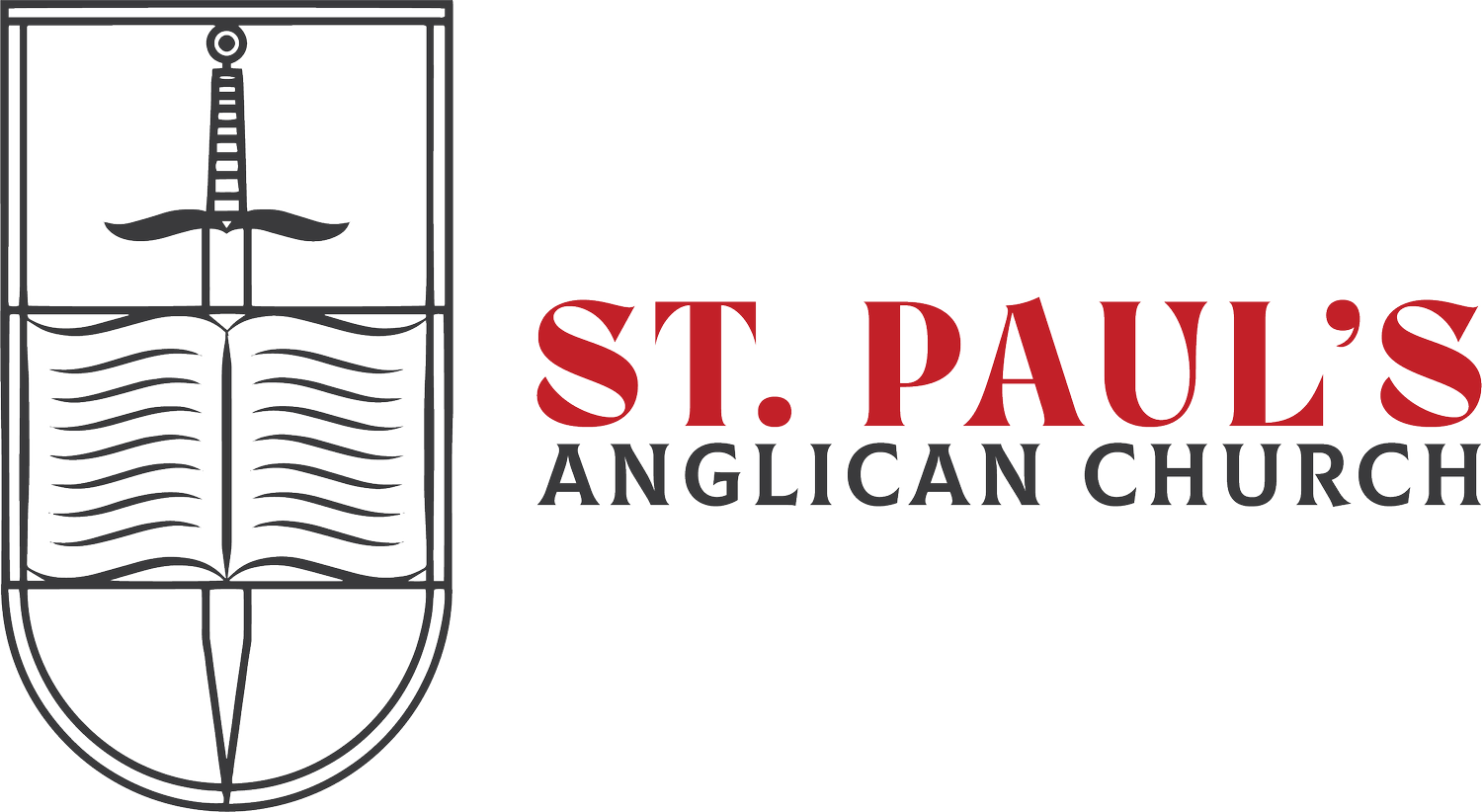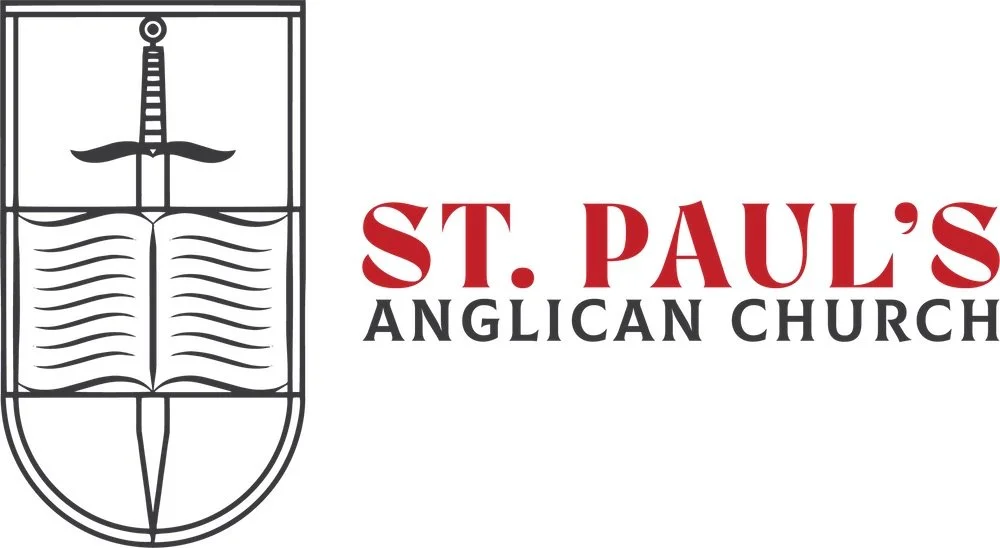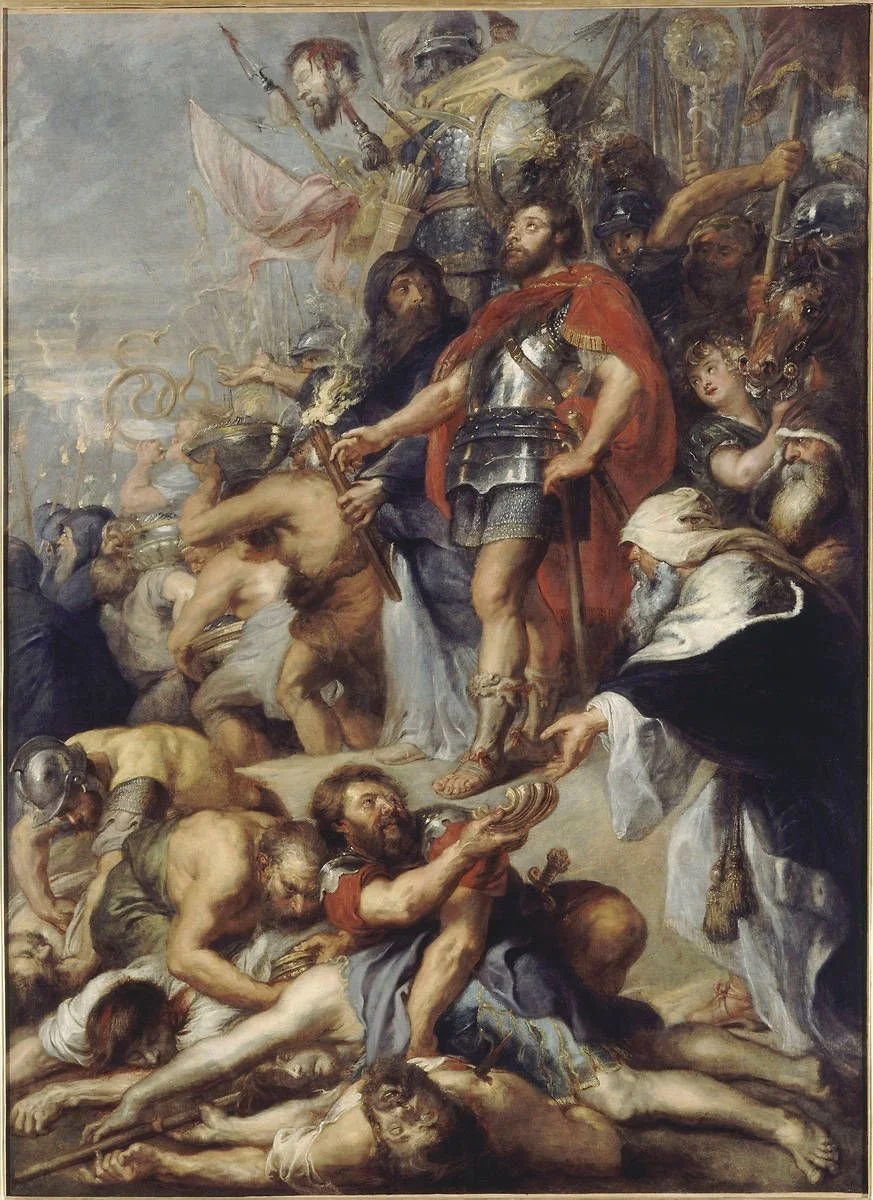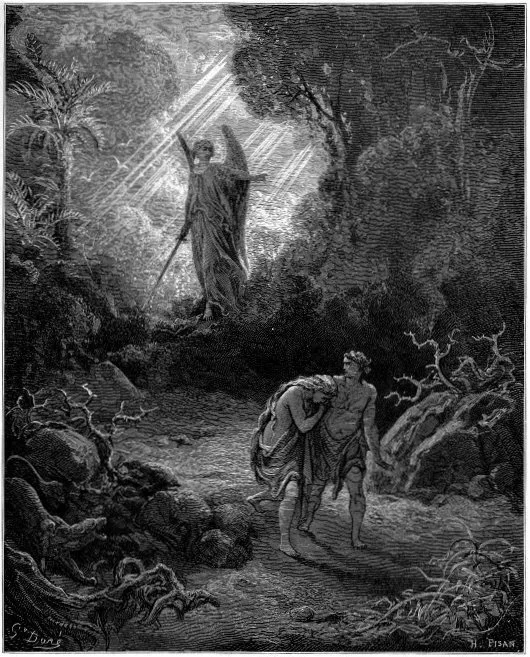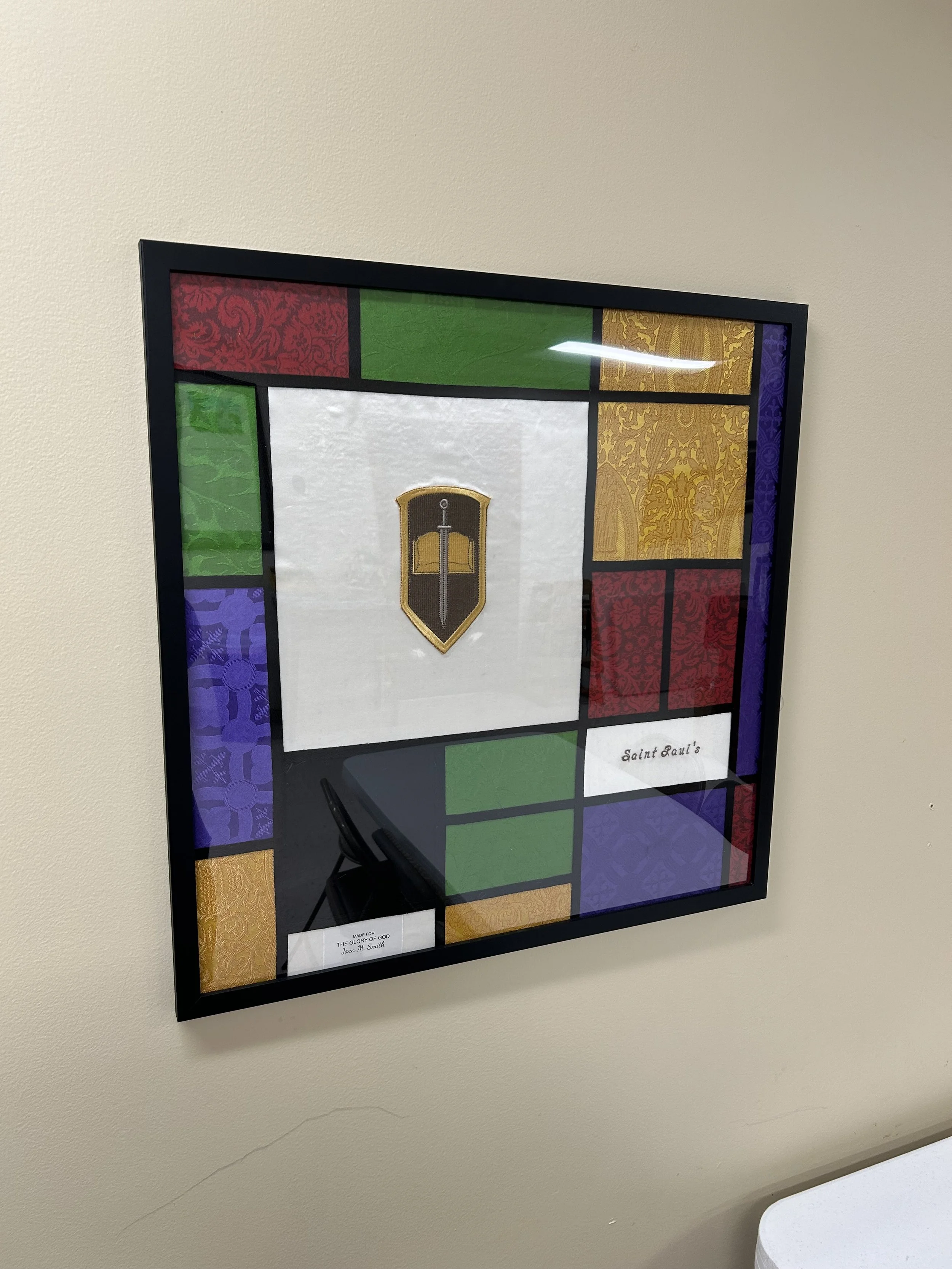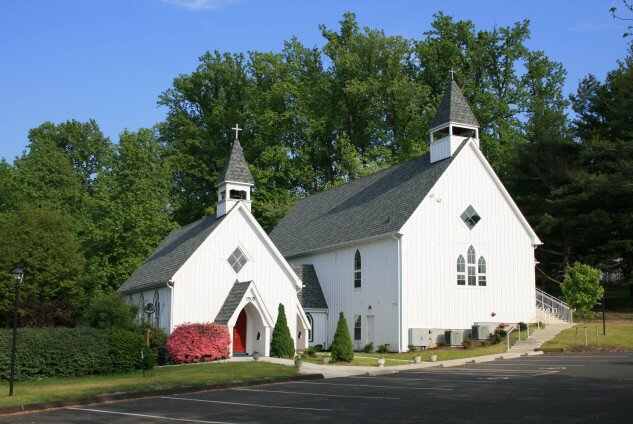
NEWS
The Slate of Vestry Candidates for 2024
The Annual Meeting for 2024 is October 6. That day, we will have one service at 10a with the business meeting and parish meal to follow. One of our business items is to elect three vestry candidates who serve three year terms. The Vestry is made up of members of the parish who ensure that the parish has a rector, that the rector has all things needed to function, that the church building is cared for, and funds are properly administered. Each year, the Vestry appoints a Nominating Committee, typically composed of the three members whose terms are ending. The Nominating Committee proposes new candidates for Vestry. Those candidates are then confirmed by the Vestry and put before the congregation for a vote.
This year, we are blessed to have three excellent Vestry candidates:
Jennifer Bryan (Incumbent)
I am running for a second consecutive term for the vestry, on which I currently serve as corporate secretary. I have been a member of St. Paul’s for about 15 years, and have sung in the choir for at least a decade. It is an honor to work with the clergy and fellow vestry members to further St. Paul’s mission. To provide a little background, I have a B.A. in history from Loyola University Maryland, an M.A. in history from the College of William and Mary, and a Ph.D. in history from the University of Maryland, College Park. I am Head of Special Collections & Archives/Archivist at the U.S. Naval Academy. Special Collections & Archives houses Nimitz Library’s rare books, manuscripts, photographs, and other documents as well as the academy’s official records. It would be a privilege to continue to serve the parish as a member of the vestry.
Karen Royer
Karen is a lifelong Marylander, having been baptized and married at St Anne’s in Annapolis and confirmed at St. Martin’s in the Field in Severna Park. Karen has a BA in math from Goucher College and a MS in Computer Science from Johns Hopkins, and worked for Westinghouse and G.E. Space Division. Karen says “While my family (Bob, John, Jim and Mark) and I are members of Woods Memorial Presbyterian Church in Severna Park, my love for the 1928 Prayerbook brought me to St. Paul’s in 2001. As a member, I have participated in Bible study, altar duty, Women’s Guild, and ushering duties, and have also attended Synods in 2005 and in 2010, both in Georgia. The Anglican worship, historic faith, and a congregation that truly seeks to live the Gospel ring true at St. Paul’s, and I am honored to be part of this congregation.”
Ken Sabel
Ken has been a member of St Paul’s since 2019 and is a retired federal employee with a background in IT and human resources. He served on the board of directors for Colonial Players for six years, four years as publicity director, and two years as president. He is a graduate of University of Maryland Baltimore County with a BA in history.
How Many Books Are in the Bible?
"The Archangel Raphael and Tobias" by Titian (c. 1512-1514) depicts one of the storylines in the book of Tobit
You may have noticed that we’ve had some readings from Ecclesiasticus over the past few weeks. Ecclesiasticus—also known as Sirach—is not the same as Ecclesiastes. Depending on what kind of Bible you have, you may be unable to find Ecclesiasticus because some sects argue that it shouldn’t be considered part of the Bible. Every major Christian tradition agrees on the 66 books divided into Old and New Testament. If, however, you happen to acquire a Catholic Bible, you’ll find seven additional books: additions to Esther, Tobit, Judith, 1-2 Maccabees, the Book of Wisdom, Ecclesiasticus (Sirach), Baruch and the Letter of Jeremiah, and additions to Daniel (the Prayer of Azariah and Song of the Three Holy Children, Susanna and the Elders, and Bel and the Dragon). The Eastern Orthodox also include these and a few other additions in their canon. As always, Anglicanism feels caught in the middle: do we agree with the Protestants, Roman Catholics, or the Orthodox? How many books should be in an Anglican Bible?
We might begin with the New Testament. While it would be easy if there was an established canon that Jesus, Paul, and other early Christian figures adhered to, it is unclear exactly what books were deemed canonical or not. Most of the books that are in the Apocrypha were written after their Old Testament counterparts. Yet, it is important to note that the New Testament authors were steeped in the Jewish tradition and the Apocrypha would have played a part in influencing their world view. However, there are certainly allusions in the New Testament to apocryphal books. For example, Jude 1:14-15 includes a rather obscure reference to Enoch:
Jude 1:14-15: “And Enoch also, the sseventh from Adam, prophesied of these, saying, Behold, the Lord cometh with ten thousands of his saints, to execute judgment upon all, and to convince all that are ungodly among them of all their ungodly deeds which they have ungodly committed, and of all their hard speeches which ungodly sinners have spoken against him.”
I Enoch 1:9: “Behold! he comes with tens of thousands of His holy ones to pass judgment upon all.”
Jude also alludes to a now lost book called The Assumption of Moses in v. 9 when he mentions, “Yet Michael the archangel, when contending with the devil he disputed about the body of Moses, durst not bring against him a railing accusation, but said, The Lord rebuke thee.”
St. Paul seems to draw from the Wisdom of Solomon 13-14 in Romans 1:18-32 in his condemnation of idolatry. Jesus himself seems to be playing with Ecclesiasticus 40:15 when he tells the parable of the mustard seed in St. Matthew 13:31-32:
Ecclesiasticus 40:15: “The children of the ungodly shall not bring forth many branches: but are as unclean as roots upon a hard rock.”
St. Matthew 13:31-32: “The kingdom of heaven is like to a grain of mustard seed, which a man took, and sowed in his field: which indeed is the least of all seeds: but when it is grown, it is the greatest among herbs, and becometh a tree, so that the birds of the air come and lodge in the branches thereof.”
While these are hardly definitive, it does show that these books were active in forming the writers of Scripture. For this reason, many, but not all, early Christians quickly acknowledged these books as authoritative. For example, St. Irenaeus of Lyons, who lived from 120-180 numbered Tobit among the prophets (Against Heresies 1.30.11), cites the addition to Daniel known as Bel and the Dragon, (4.5.2), and quotes the book of Baruch (5.35.1). Clement of Alexandria (150-215) quotes Ecclesiasticus (Paedagogus 1.8, 2.3, 2.5) and Tobit (Stromata 2.23, 4.12). While many of the early Fathers agree with Irenaeus and Clement, it was not unanimous which books should be included or excluded, but many of these works made it into the Church’s liturgy. St. Jerome, the translator of the Vulgate (the Latin Bible), argues that certain of these books, like Judith, Tobias, and Maccabees, ought to be read in the liturgy “for the strengthening of the people, but not for confirming the authority of ecclesiastical dogmas.” Jerome’s position is the minority one, but there is a clear through line of theologians who agree. Twelfth-century theologian Hugh of Saint Victor makes a clear distinction between the canon and deuterocanonical books; the former are authoritative and used to make doctrine while the latter are read for edification but not the establishment of dogma.
"The Triumph of Judas Maccabeus" by Peter Paul Rubens (1634-1636)
Many of the English Reformers took this position. Article 6 in the 39 Articles says:
“And the other Books (as Hierome saith) the Church doth read for example of life and instruction of manners; but yet doth it not apply them to establish any doctrine; such are these following:
The Third Book of Esdras,
The Fourth Book of Esdras,
The Book of Tobias,
The Book of Judith,
The rest of the Book of Esther,
The Book of Wisdom,
Jesus the Son of Sirach,
Baruch the Prophet,
The Song of the Three Children,
The Story of Susanna,
Of Bel and the Dragon,
The Prayer of Manasses,
The First Book of Maccabees,
The Second Book of Maccabees.”
This position has remained true of Anglicans who have integrated these books into our liturgical life, while also not drawing from them to establish theological positions that can only be supported using them. In fact, if you’ve been doing Evening Prayer recently, you might have noticed that the first Scripture lesson has been from Ecclesiasticus since the Thursday after the Twelfth Sunday after Trinity and will continue to be so until the Wednesday after the Sixteenth Sunday After Trinity (see BCP xxxii-xxxv). Further, Sunday Morning Prayer readings are often prescribed from the Deuterocanon, which is how they get worked into our liturgy on Sunday mornings.
To close, it might help to tell a story. The American Bible Society, an American group that helps distribute Protestant Bibles, was eager to make a Bible for the late Elizabeth II to be coronated on in 1953. Unfortunately, they were not allowed to because English monarchs have to be coronated on the whole Bible and the American Bible Society’s charter prevented them from including the Apocrypha in their Bibles. So, as Anglicans, we recognize that there are 73 books of the Bible, but we also understand that not all those books are of equal authority so we make a distinction between the Canon (books that are fully authoritative) and the Deuterocanon (books that are not fully authoritative). As Abp. Mark Haverland of the Anglican Catholic Church says in his book Anglican Catholic: Faith and Practice, “The Anglican position on the Apocrypha is intermediate between that of hte Roman Catholics and of the Protestants (though the Lutherans agree with us). Anglicans do not base doctrine (‘dogma’ in the official Latin text of the Articles), meaning an essential teaching, on the authority of the Apocrypha alone. Lessons from the Apocrypha are often assigned to be read in Morning and Evening Prayer, and canticles from the Apocrypha are sung at Morning Prayer (BCP, pp. 11-13, from the Song of the Three Children). The Puritans in the 16th and 17th centuries attacked the Prayer Book for this use of the Apocrypha.” How many books are in the Anglican Bible? 73, but with a bit of a caveat.
Raynaldo’s Back to School Supplies Giveaway a Great Success!
A big thank you to all our parishioners who donated to this wonderful event. Approximately 900 children received much-needed supplies for the coming year. Father Wes, Mary Caruthers, and Raynaldo worked to make sure the participants received hot dogs, chips, water and ice cream too. Because of St. Paul’s generous contribution of $2,050 to this event, many families were helped. THANK YOU ONCE AGAIN FOR YOUR GENEROSITY!
The Episcopal Charge to the 56th Annual Synod of the Diocese of the Eastern United States
From July 30 through August 2, delegates of the Diocese of the Eastern United States of the Anglican Province of America met in Greensboro, North Carolina for our 56th Annual Synod. As is custom, our Bishop, Chandler Holder Jones, delivered a wonderful address on the topic of vocations to the Priesthood.
Embark on a Journey through Genesis with the Friday Bible Study!
Join us for a Friday Bible Study delving into the foundational stories of the book of Genesis. Beginning on Friday, September 6 we'll gather for Morning Prayer from 9:30 AM to 10:00 AM, followed by an engaging study of Genesis from 10:00 AM to 11:15 AM. The study will explore the creation narratives, the lives of the patriarchs and matriarchs, and the profound themes of covenant and promise that shape our faith. We'll conclude our time together with Holy Communion at 11:30 AM. All are welcome to join us as we journey through the rich tapestry of Genesis and discover its enduring relevance for our lives today. If you have any questions, please contact Fr. Wesley (wwalker@stpaulscrownsville.com).
If you would like to utilize a commentary to enhance your study of Genesis, the recommended commentary is Tremper Longman III’s The Story of God Commentary: Genesis.
New Art Added to the Parish Hall
Psalm 96:9 tells us to “worship the Lord in the beauty of holiness: fear before him, all the earth.” As Anglicans, we pray this daily at Morning Prayer during the Venite. Beauty matters! It forms us, shapes us, and orients us to the good. For this reason, we are very excited to have hung up a new art piece produced by our very own Joan Smith. For those who may be aware, Joan is an expert craftswoman who has made awe-inspiring vestments that Fr. Wesley and Fr. David wear regularly!
“Liturgical Colors” by Joan Smith
Stained Glass Quilt Block Motif
St. Paul’s shield is a sword and a Bible because the Scriptures are “sharper than any twoedged sword” (Heb 4:12). St. Paul is responsible for most of the New Testament, so it’s a fitting symbol for him. This is reflected in our parish logo.
In this piece, the Apostle Paul’s shield was machine embroidered with over 31,000 individual stitches, taking two hours to complete.
Thank you to Joan for contributing this wonderful piece to make our space even more beautiful than it was before!
Proposed Plans for Crownsville Hospital Memorial Park
At St. Paul’s, we have a vested interest in what goes on in our community. As many locals may know, Anne Arundel County is working on developing the abandoned grounds of Crownsville Hospital into a park and other buildings. If you click on the button below, you can see some of what they are planning to do with that area:
Raynaldo Brown’s “Back to School” Supplies Collect Begins Sunday!
Raynaldo Brown’s “Oxford Landing’s Back-to-School Supplies Giveaway” is scheduled forWednesday, August 21, 2024 FROM 1 TO 5. The giveaway and will be held in person and there will be activities and food for the children and their families! This has been a favorite Missions Outreach event for several years, and we are once again asking for donations to this effort. As in years past, both cash donations and school supply donations are welcome. If you are attending services at the church, envelopes marked for school supply donations are in the pews and at the back of the church. If you are not attending church in person and would like to donate to this effort, please send your donations to the church to Johnson Waite’s attention and please mark your check that it is to be used for the school supply effort. Last year, our wonderful congregation gave over $2,800 to this event. Thank you in advance for your continued generosity to help less fortunate children to be ready for the new school year.
Updates to the Annex and Parking Lot
One of the issues we’ve run into at St. Paul’s over the past six months or so has been a lack of space. Parking is getting tight on Sundays and we have an uptick in activities and not much space in which to do them! As a result, the vestry has been researching and discussing a variety of proposals for maximizing the space we have in an affordable way. To that end, there are two updates that I’m excited to share with you:
The Sunday School Building, AKA the Annex
As many of you know, we have a Sunday School building in our back parking lot. Lance Smith did a lot of work clearing out the stuff that had been stowed in that space. The loft was removed. John Schulte did some sealing treatments and put in hard flooring. If you see Lance or John this Sunday, please thank them for all their hard work on this project! Moving forward, this gives us a second space to use when the Fellowship Hall is occupied, allowing us more flexibility in scheduling various events. Here’s what it looks like inside now:
The Parking Lot
The other issue we’ve had recently is that our parking lot gets crowded, especially during the transition between the 9:30a and 11a services. After considering a few proposals, the Vestry voted to accept a bid that involved expanding our parking area by 6,930 feet. On Wednesday, they started and finished the job. Here are the pictures:
Because of this addition, we would like people to stop parking parallel to the cemetery. When people park there, it’s very hard for others cars to get in and out. Further, we’ve had an incident where someone hit the fence around the cemetery. This extended parking area will hopefully prevent these difficulties in the future.
As always, we should think our Vestry for their work in ensuring the well being of St. Paul’s! And, of course, it’s important to say thank you to all our parishioners for making St. Paul’s such a wonderful place.
Blessings,
Fr. Wesley
